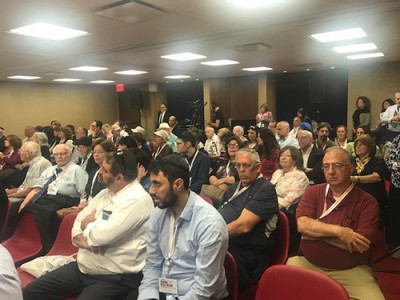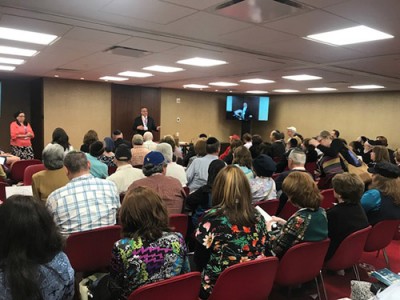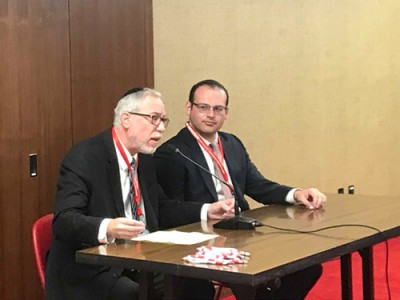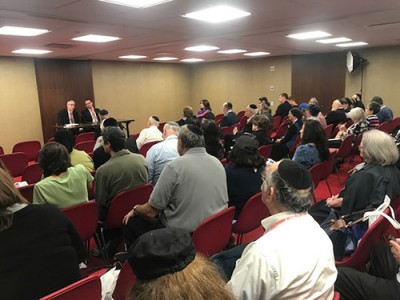







Achiezer did not disappoint with its third installation of the Jewish Healthcare Conference and Expo this past Sunday at the TWA Hotel. The array of featured medical resources covered the gamut of the healthcare arena, showcased by Northwell Health’s wide range of services and its facilities both in Valley Stream and Forest Hills. The event provided for Jewish healthcare consumers, caregivers, vendors and service providers to network in a vibrant space highlighting proactive healthcare and eldercare. Empowerment and education were at the forefront of organizers and presenters’ minds, as attendees sought solutions for either themselves or others in their midst. One Kew Gardens Hills resident noted that he attended to find available resources for his mother-in-law as she had just moved into his residence with early stages of dementia. So inspired by an early lecture, this gentleman hastily arranged for his mother-in-law to join. Achiezer board member Dovid Bloom stated how powerful of an experience it was to witness such a variety of people seeking their own avenues to deal with the years that are to come.
Code red! Rockets were falling in Israel! Day after day the sirens rang in this town and one Chassidic child ran from corner to corner screaming on the top of his lungs putting his life into severe danger along with his mother who tried to chase him down. Dr. David Pelcovitz expounded, throughout Elul the shofar sounds, “Code red, code red, get up!” We are not alone; our father is there to protect us. One day the mother was a bit fed up and pulled her child aside, “I am here to protect you; you are not alone.” From that day forward, when the sirens blasted “code red!” the child remained calm and walked into the shelter holding his mother’s hand. We are all created to parent our children.
Rav Matisyahu Solomon, the famed mashgiach ruchani of Beth Medrash Govoha in Lakewood, NJ relates with regards to the last bracha of birchas ha’shachar we pray to have strength as we are tired. Why do we not ask simply to not be tired? It is straightforward, one aspect of living is to be tired! We are obligated to transform our challenges into meanings of growth and meet our challenges and strengths to deal with fatigue.
Eight years ago, Achiezer launched as the foremost health and social service outlet for the Five Towns and Far Rockaway region and remains the first call during times of need as it is the pulse of the community. Orthodox Jewry often hears of the outstanding community crisis mode and collaborative work or their Zichron Dovid Chesed Shel Emes’ painstaking diligence during times of peril, but there is much more. The organizations skillset includes: a twenty-four-hour emergency medical services hotline, Shabbos and Yom Tov hospital meal arrangements, a health insurance advisement program, a premiere medical referral support system alongside a mental health initiative and a program to obtain specialty medical equipment. There is also a volunteer network for three unique agendas: drivers for meals and rides, home repair assistance for those in need in addition to a financial management program.
Upon walking the famed red carpet of the TWA terminal, I was expecting medical personnel clad in 1970’s apparel to guide me to my destination, in their stead I found an enthusiastic Chief of Operations for Achiezer, Shalom Jaroslawicz, who efficiently provided suitable landing. He exclaimed his appreciation for helping unite and school the Queens and Five Towns communities of their healthcare wishes.
Many elderly attendees traveled with hopes to continue maintenance of their own healthcare options, while some focused on their impending retirement. James from Lawrence, NY proudly announced that just last week he informed his law firm that he is 6 months away from retiring and came to arrange for the years ahead. Achiezer’s president Rabbi Boruch Ber Bender observed, “We directly impacted hundreds looking for their path to a better healthcare, hearing from attendees that they will incorporate and use the tools gained today to better cope with the trials that are to come makes all the work worthwhile. If we walk away and helped even one person that is enough!”
Several informative breakout sessions were held throughout the afternoon each to a standing room only crowd. Coordinated to perfection by Gittie Neufeld, each respective talk enthralled audiences on a range of healthcare and eldercare themes. Hennie Friedman authored The Unexpected Journey detailing the experiences and toll that Lew Body Dementia took on her husband, Moish, from the young age of 57 in 2008 who had practiced tax law as a CPA for thirty years and gave an early morning daf yomi shiur. She credits her immense sensitivity to her time as a nurse with the Hebrew Academy for Special Children, HASC.
The day of her youngest son, Yitzy's, engagement party arrived, and the Friedman home was filled with excitement, but the question lingered of how to address their father who had been experiencing psychotic episodes. The family sat together and finally concluded it best to leave him resting at home as he disappointingly did not recall his own name. To their surprised the patriarch of the Friedman family arose and beckoned over his dear Yitzy, "I just wanted to congratulate you," he exclaimed. Obviously this period of normalcy was short lived, nonetheless, it brings to light that those around a patient suffering from dementia never know what actually circulates their mind and we must always remain conscious and diligent of our words and actions never forgetting to treat a patient with the utmost dignity.
Her remarkable tale of courage and devotion in the face of uncertainty led to establishing key themes for those in a similar situation. It is most imperative to always take care of yourself. This point hit home when her eldest son, Zevie, spoke on behalf of her 8 married children explaining how her months of tears led to a feeling that their family was not only losing their father, but also their mother. Friedman continued, seeking out help should never be frowned upon and it may be wise to speak with a friend or therapist and accept temporary assistance from medication to calm one's nerves and cope easier.
The financial burdens associated with eldercare are often exhaustive. The United States government offers Medicaid to combat costs and arrange for a home health aide to assist patients in daily activities. Pushing off the necessary paperwork is puerile; consider hiring a company uniquely designed to deal with this undertaking and ensure a proper path is instituted.
While a patient is capable, they should take advantage of the outdoors and participate in various activities as waiting for a family member to arrive home after a long day’s work only stresses the family further. Often inviting guests and working to find the correct financially compensated friend will ease familial hardships. When one with dementia is left at home, it is always wise to have a note near the door explaining the circumstances. Yet a spouse's vision should always be considered, and an ingenious manner should be developed to preserve the dignity of the patient.
Dr. Luca Giliberto, MD, Phd, a respected neurologist at Northwell Health and a professor at the Alzheimer’s Center, Feinstein Institute for Medical Research and Northwell Neuroscience Institute reiterated the importance of patients joining in social activities. Dementia is defined as without mind. Participation in public events assists those suffering with the obvious physical exercise of moving about but more significantly with keeping the brain active.
When one’s time in this world is ending, there are various halachic and practical considerations while striving for the optimum culmination. Following Rabbi Ashie Schreier’s appointment as rabbi of the Young Israel of Forest Hills he invited an esteemed friend for a special Shabbos to share with his congregants a colleague that may lend a hand to their end of life queries. Rabbi Dr. Aaron E. Glatt, MD is the assistant rabbi at the Young Israel of Woodmere and holds the medicine chair at Mount Sinai South Nassau alongside various other accolades. He mentioned the halachic perspective of a popular secular news story – physician assisted suicide. One will never come across a posek who will allow a medical doctor to knowingly cause a patient to die as this is a blatant act of rechitza, murder. A common difficulty often arises in the Jewish world – Is not conducting a medical procedure on a terminally ill patient a murderous action? If the patient opts to withstand the pain and suffering, this is their halachic right and we allow the procedure to progress, nonetheless, if the agony is simply too intense for the patient, we respect their right not to proceed despite the inevitable only being prolonged. But how is terminal defined? For insurance purposes, the secular world often chooses a 6 months span, while halacha will use 1 year. Halacha also does not classify one to be terminal if there is even the slightest chance for a reversal; in an acute setting (such as end-stage cancer) one should always take the strictest route but remain steadfast in adhering to the patient’s wishes.
Another quandary revolves around inserting feeding tubes, conducting dialysis and other life sustaining artificial measures. It would not be allowed to remove something sustaining life as this is an act of killing. As in every dilemma, one must always seek advice of the family’s rebbe. Halacha dictates that each act of dialysis is a different action and we are not required to undertake a new action to sustain life, meaning when a patient opts to halt new instances, we follow their biddings. Alternatively, by water and a feeding tube most rabbinic authorities agree it is one continuous action, still we would not insert such a device against the patient’s will. It was noted that since there is no legitimate purpose to entirely withhold oxygen on a respirator, such an action is not allowed, however a minimal decrease might be acceptable. Hospitals follow the directives of the patient. To this end, forms such as a Do Not Resuscitate, DNR, form or a healthcare proxy should always be kept in a visible location. Hatzolah ambulatory services are known to check the refrigerator, while a hospital may keep such forms on file if the patient is a regular visitor.
A man is in a skiing accident and his legs must be amputated. The man insists that the procedure not be conducted despite his impending demise. Rabbinical authorities decided that we must do what is necessary to save another’s life and his legs were removed. It can never be reiterated enough times that the standard medical approach is not the halacha as each case is different and even if the physician dons a yarmulke, proper rabbinical advice must be sought. Rabbi Schreier who holds the position of coordinator and director of the Private Pay Division for Caring Professionals related that eldercare is a difficult field where each issue is unique, but one must always be fully informed and remain strong and attentive to all factors.
Dr. Seymour Huberfeld, MD, an assistant professor at the Donald and Barbara Zucker School of Medicine at Hosftra University and a Northwell Health doctor gave his onlookers a breath of fresh air discussing common pulmonary conditions. Ronald Spirn, a certified elder law attorney conversed on how to best protect one’s assets and plan their estate along with how to most correctly qualify for governmental aide in the form of Medicaid.
Dr. David Pelcovitz is a noted psychologist and lecturer to all segments of the world. He stresses that there is no greater power than to remain at someone’s side as the physical act of holding their hand is the most proactive pain killer. One should take pride in standing beside a spouse or parent who is undergoing a painful medical procedure. However, if it has been revealed that the two get on one another’s nerves, it is unwise hold hands as this may cause agitation and instead the family should turn to a good friend or therapist to lend their hand.
Empathy is a surreal and lofty concept. A neurobiological component was discovered that even without eye contact, the more one engrosses their mind in the feelings of another, the more their pain will be eased. Moreover, if there is a heart to heart or eye to eye connection at a person’s bedside during their time of peril, their pain will alleviate.
Imagine a Rosh HaYeshiva’s family with a dozen children running about. The eldest, a boy of seventeen, rebels against his demanding family dressing inappropriately and hanging out with the wrong crowd. The parents are consumed with thoughts of their family being torn apart and their younger children being influenced by their brother’s unruly mannerisms. As this pattern continues, these pillars of society financially cut off their son, sending him into the life of a drug dealer. Imagine the panic as word spreads of the Rosh HaYeshiva’s son’s misdeeds. With no apparent choice, the family goes to their own rebbe with their unfortunate plight. The rebbe resolves to send their son into the street with only the clothes on his back. Now visualize Dr. Pelcovitz’s uneasiness as this exact case sat before his desk. The revered doctor is granted permission from the family to speak with their rebbe who listens nonstop to his advice and finally admits to a blunder. But what is to be done? The teenager is not ready to return home!
Rosh Hashana is soon to arrive, and the pair decide to send the child to his aunt and uncle in the Midwest for some peaceful reflection. The boy respects his relatives and admires their willingness to take him in; despite his disdain for religion, he opts to join them on their walks to shul. However, he slips up with timing and returns to the sanctuary before the Rosh Hashana davening has completed. It is none other than the final forty shofar kolos that rattles him to the core. Blast after blast slices through his heart sending him into a sudden burst of tears. The teen returns to the East Coast for the Aseres Yemei Teshuva and heads straight to his psychologist’s office. Shaking before Dr. Pelcovitz, he proclaims, “I was done with religion and now I am filled with confusion!” Now 5 years later, the teenager transformed into a man, the president of his modern Orthodox shul and the proud chumash chavrusa of his dear father. We must never cut off contact, lest there is always some hope.
By: Shabsie Saphirstein
Achiezer Prepares Our Community For The Years Ahead
Typography
- Smaller Small Medium Big Bigger
- Default Helvetica Segoe Georgia Times
- Reading Mode


